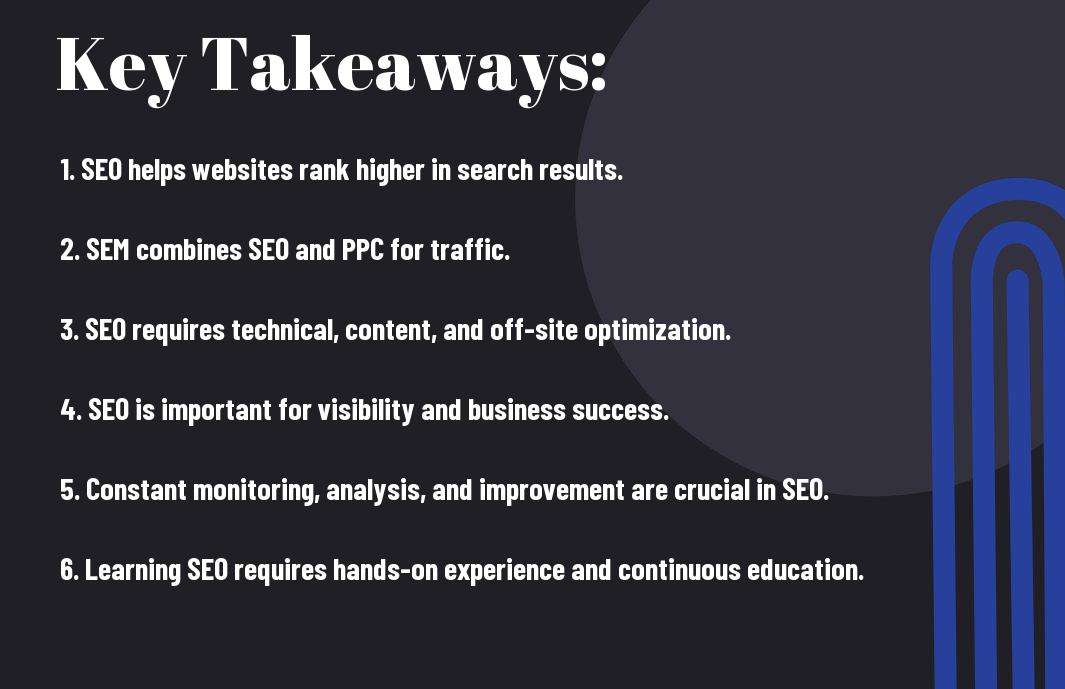Search Engine Optimization have long been a mystery for many, but fear not, as we explore into the intricate world of optimizing your website for search engines. In this comprehensive guide, we will uncover the fundamental principles, techniques, and strategies to boost your visibility in the digital realm. Whether you’re a beginner or a seasoned pro, this article will equip you with the knowledge and tools needed to master the art of SEO and skyrocket your online presence. So let’s launch on this transformative journey together and unlock the true potential of SEO!

What Is SEO – Search Engine Optimization?
Understanding SEO
Search engine optimization, or SEO, is the process of enhancing your website’s visibility on search engines like Google and Microsoft Bing. It involves improving your website to attract more visitors who are searching for products, services, or information related to your expertise. SEO consists of technical, on-site, and off-site optimizations to increase your rankings on search engine results pages.
Importance of SEO
The global SEO industry is forecast to reach a staggering $122.11 billion by 2028, demonstrating the immense impact of SEO on businesses. With 53% of all website traffic coming from organic search, SEO plays a vital role in driving traffic and achieving business objectives. Improving visibility and rankings on search engines can lead to increased website visitors, conversions, and revenue.
With trillions of searches conducted every year, search is a primary source of website traffic, making it crucial to have a search engine-friendly online presence. SEO is sustainable, unlike paid campaigns or social media traffic, providing long-term benefits for brands and businesses. By understanding your target audience and optimizing for search engines, you can enhance your online visibility and achieve key business goals through SEO.
How SEO Differs from SEM and PPC
Little differentiates SEO from SEM and PPC. SEO, or search engine optimization, involves optimizing your website to increase visibility in search results. Meanwhile, SEM, or search engine marketing, encompasses both SEO and PPC activities to drive traffic through organic and paid efforts. PPC, or pay-per-click, refers to digital marketing where advertisers pay when their ads are clicked. For a comprehensive guide to SEO, check out The Ultimate Guide to SEO: A Beginner’s Guide from BizIQ.
SEM vs. SEO
Search engine marketing and search engine optimization differ significantly, SEM includes both paid and organic efforts to drive traffic, while SEO focuses solely on organic search results to improve visibility and attract website visitors.
PPC vs. SEO
To differentiate, PPC involves advertisers bidding on keywords to have their ads displayed in search results and paying for each click. On the other hand, SEO aims to improve organic traffic through optimizing website content and visibility in search engines, providing sustainable results over time.
Types of SEO
For a comprehensive understanding of SEO, it’s necessary to explore into the different types of optimization strategies. The information is broken down below into a table with 2 columns and 5 rows:
| Technical SEO | On-site SEO |
|---|---|
| Optimizing technical aspects of a website. | Optimizing content for users and search engines. |
| The foundation for SEO success. | Essential for high-quality content creation. |
| A critical element in search engine ranking. | Includes keyword research and relevance. |
| Focuses on site architecture and user experience. | Optimizing HTML tags and meta data. |
| Includes aspects like structured data and site security. | Enhances readability and content structure. |
Technical SEO
The foundation of SEO success lies in technical optimization. Key elements include ensuring websites are easily discovered and accessed by search engines, optimizing loading speeds, creating a positive user experience, and leveraging structured data to enhance search engine understanding.
On-site SEO
Onsite optimization is crucial for optimizing website content for both users and search engines. It involves covering relevant topics, including appropriate keywords, ensuring content is unique, up-to-date, and multimedia-rich, providing a better user experience, and effectively incorporating HTML elements like title tags and meta descriptions.
A strong on-site SEO strategy not only boosts search engine visibility but also enhances user engagement and trust. By aligning content with audience needs, implementing relevant keywords, and optimizing HTML elements, websites can improve their rankings and provide valuable information to visitors.
Off-site SEO
One of the key aspects of SEO includes off-site optimization strategies. This entails building brand assets, gaining quality backlinks from reputable sources, enhancing brand awareness and reputation through public relations, content marketing, social media optimization, and managing online listings and ratings effectively.
To maximize SEO success, it’s crucial to focus on creating a strong off-site presence that supports on-site efforts. By emphasizing brand-building, link-building, reputation management, and engaging with audiences across various digital platforms, websites can increase their online visibility and authority.
SEO Specialties
Ecommerce SEO
On the specialized front of Ecommerce SEO, the focus is on optimizing category pages, product pages, faceted navigation, internal linking structures, product images, reviews, schema, and more. Ensuring that your Ecommerce site is fully optimized for search engines can significantly impact your online visibility and drive more traffic to your online store.
Enterprise SEO
Specialties in Enterprise SEO involve managing massive-scale SEO projects, often with websites comprising over 1 million pages or for organizations with significant revenue. Dealing with large-scale organizations requires handling delays in implementing SEO changes, engaging multiple stakeholders, and navigating complex SEO strategies.
International SEO
Any global business looking to optimize for international markets should focus on International SEO. This type of SEO involves optimizing multilingual or multiregional websites and tailoring strategies for search engines like Baidu or Naver. International SEO requires understanding the nuances of optimizing for diverse global audiences.
Local SEO
For businesses looking to enhance their visibility in local search results, Local SEO is paramount. Local SEO strategies involve managing business listings, obtaining reviews, optimizing for local searches, and improving online presence to attract local customers. It’s crucial for brick-and-mortar stores and service-based businesses targeting local communities.
News SEO
With a specific focus on news portals and publishers, News SEO aims to optimize content for quick indexation and visibility in news-related search results. Effective News SEO strategies prioritize speed to ensure content appears promptly in news features and top stories, meeting the demand for up-to-the-minute news updates.
How Does SEO Work?
Once again Unlock the Secrets of SEO: The Master Key to Higher Search Engine Rankings.
Understanding Search Engines
On the surface, understanding how search engines work may seem complex, but it can be broken down into four main stages: crawling, rendering, indexing, and ranking. Search engines like Google scour the web using crawlers to discover pages, analyze content, and determine relevance based on complex algorithms.
Researching
Search engine optimization starts with in-depth research, including audience analysis, keyword research, competitor insights, and website audits. By delving into these areas, SEO professionals can identify opportunities, optimize content, and enhance overall website performance.
Planning
Search Engine Optimization strategies require meticulous planning, goal-setting, defining metrics, and establishing clear processes. A well-crafted SEO plan serves as a roadmap guiding the implementation of effective tactics to drive organic traffic and achieve business objectives.
Creating and Implementing
On the execution front, SEO professionals create and optimize content, implement site enhancements, and remove outdated content. By focusing on both on-page and off-page strategies, they work to improve search engine visibility and user experience for sustained growth.
Monitoring and Maintaining
Implementing robust monitoring practices ensures quick detection of any issues affecting website performance. Regular maintenance, including addressing broken links, slow loading times, or content updates, is important to keeping the website optimized for search engines and users.
Analyzing, Assessing, and Reporting on Performance
One of the critical aspects of SEO success is analyzing, assessing, and reporting on performance metrics. By leveraging tools like Google Analytics and Search Console, SEO professionals gain valuable insights into user behavior, keyword performance, and overall website health to drive continuous improvement in search visibility.
SEO Is Ongoing
Not to burst your bubble, but SEO never sleeps. It’s like that friend who just can’t stop talking about their favorite topic – always there, always changing. Just like how the global SEO industry is forecasted to reach a whopping $122.11 billion by 2028, SEO itself is a constantly evolving field that requires constant attention and adaptation.
Search engines, user behavior, and your competitors are always on the move. Websites change over time, content becomes stale, and algorithms get a facelift every now and then. To stay ahead in the game, your SEO processes should improve, become more efficient, and adapt to new trends and developments.
So, what’s the bottom line here? The secret to SEO success lies in constant monitoring, testing, and improvement. There’s always something to tweak, optimize, or experiment with. As renowned digital marketing expert Bruce Clay once said, SEO will only be done when Google stops changing things and all your competition dies.
How to Learn SEO
Reading Industry News and Resources
For a comprehensive understanding of SEO, staying up-to-date with the latest industry news, research, and best practices is vital. Industry-leading resources such as Search Engine Land provide valuable insights, tips, and trends to help you grow as an SEO professional. Consider signing up for newsletters and regularly reading articles to enhance your knowledge.
Attending Events and Conferences
On your SEO learning journey, attending events and conferences is a fantastic way to gain insights from experts in the field. Events like Search Marketing Expo (SMX) offer dedicated SEO tracks with valuable presentations that can deepen your understanding of search engine optimization. Networking with industry professionals and hearing diverse perspectives can further enrich your SEO skills.
Events like SMX Advanced in June and SMX Next in November provide an excellent platform to learn about various aspects of SEO and stay updated on the latest trends and strategies. Meeting like-minded individuals and engaging in discussions can help you broaden your expertise and keep your skills sharp.
Developing Your SEO Skills
The process of developing your SEO skills goes beyond theoretical knowledge. Hands-on experience is crucial for advancing your expertise in SEO. Experimenting with building your websites, trying out different strategies, and analyzing the results will provide valuable insights into what works best in the world of search engine optimization. Continuous learning, practical application, and reflecting on outcomes are key elements in honing your SEO skills.
To wrap up
Unlocking the Secrets of SEO: A Comprehensive Guide to Search Engine Optimization provides a detailed look into the world of SEO, from its importance in today’s digital landscape to the intricacies of technical optimization and content creation. With a focus on learning the fundamental principles of SEO, conducting thorough research, and continuously monitoring and analyzing performance, this guide serves as a valuable resource for those looking to enhance their understanding of search engine optimization. By delving into the various types of SEO and exploring key SEO specialties, readers can arm themselves with the knowledge and skills needed to navigate the ever-evolving world of digital marketing successfully.
